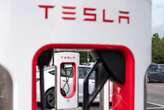When Elon Musk was on stage at the Dealbook conference last November, he had a message for advertisers who had left his X platform (formerly Twitter) after he clattered out a number of antisemitic posts.
“I hope they stop. Don’t advertise,” Musk said. “If somebody is going to try to blackmail me with advertising, blackmail me with money, go fuck yourself. Go fuck yourself. Is that clear? I hope it is.”
Seven months later, Musk found himself on stage at Cannes Lions—the world’s biggest gathering of the advertising, marketing and brand world—where he was interviewed by WPP CEO Mark Read.
Musk’s appearance on stage with the CEO of the largest advertising holding company was part apology tour, part spectacle. It was effectively his attempt to make nice and do some marketing for X in an environment where competitors like Meta, Reddit, and Snapchat all have massive brand installations and are vying for attention.
The long lines to get into the Palais’ Lumiere Theater (and the raucous ovation when Musk strolled onto the stage) felt like a paean to the ad industry’s thirst for Musk’s attention. Fast Company talked to a handful of attendees waiting in line to see the interview beforehand.
“I think it’s more about his persona, having a celebrity like him show up here. I’m not expecting any detailed marketing information,” said one Cannes attendee.
“He wants the money, and that’s fair. I think his style is to be dismissive so people want more of him and more of what he offers, because it becomes slightly more elusive,” said another.
“I’m not quite sure if it’s what he has to say, but the personality we’re about to see. That’s the main point.”
And it was.
Read opened by asking Musk to clarify his comments to the ad industry. “First of all, it wasn’t to advertisers as a whole. It was with respect to freedom of speech,” Musk said. “It is important to have a global free speech platform where people with a wide range of opinions can voice their views. In some cases, there were advertisers who were insisting on censorship.”
As with any brand pitch, marketers must establish a brand positioning. On stage, Musk positioned X as he often does: as a public service rather than a private publishing company. That premise views brands’ safety concerns as a freedom of speech issue, rather than one of choice in a free market. “Of course, advertisers have a right to appear next to content that they find compatible with their brands. That’s totally fine,” Musk said. “What is not cool is insisting that there can be no content they disagree with on the platform . . . I believe in sort of freedom of choice. Advertisers have a right to appear next to content that they think is compatible to their brand.”
The closest Musk came to a sales pitch was touting X as the platform where brands can reach the most influential people in the world. “If you’re trying to reach senior decision-makers, the people making decisions in the world, not social media influencers, but actually people who run companies, run countries, and intellectuals of the world, then the X platform is by far the best,” he said. “If you’re trying to reach Marc Benioff or Michael Dell, they actually use the platform. It’s almost the only way to reach them. They don’t do TV, they’re not doing TikTok videos.”
Overall, the interview was more notable for what wasn’t discussed than for what was. Despite happening at a gathering of marketers, advertisers, and brands, there was no mention or curiosity about Musk’s underinvestment in brand advertising for Tesla (Musk laid off Tesla’s entire 40-person marketing and growth content team barely two months ago).
Here we are at a “Festival of Creativity,” but there was no mention of the strategic and creative approach to recent Tesla work that—as I’ve written before—has ranged from somewhere between a generative AI experiment with the prompt, (“Make a generic car ad that feigns subversive but is actually corny”) and an insult to student spec ads.
At one point, Musk outlined what kind of advertising he likes. “I’m actually a fan of advertising that is artistically interesting, that is entertaining. Really the acid test being, after you see the ad, do you regret seeing it? Do you want those seconds back from your life or do you like it?”
For this piece of live marketing, it was more the latter.









No comments